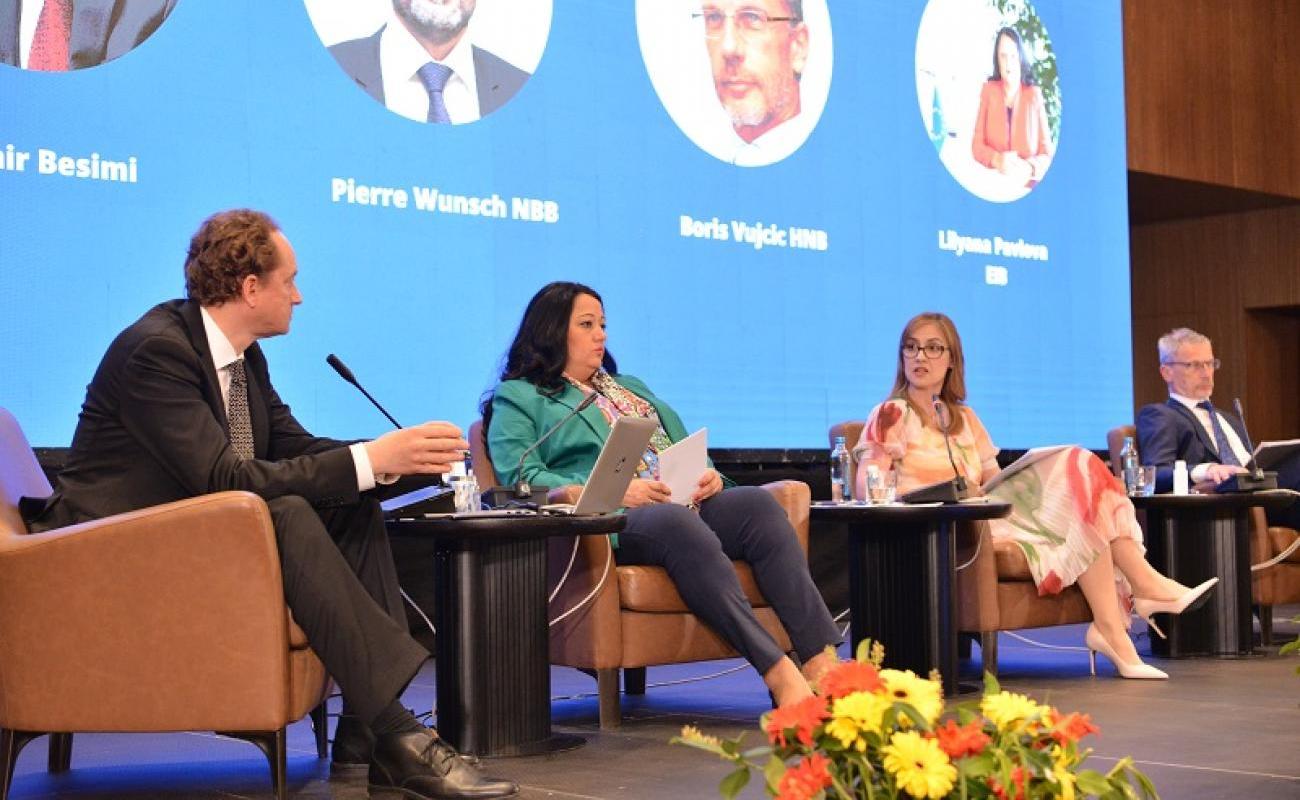North Macedonia: EIB to provide targeted support for regional economies to address negative effects of the current crisis
In the light of the current crisis, the EIB has expressed the need for increased support for the green transition, food and energy security, as well as for the private sector. The joint 8th international Research Conference in Skopje is a signal of reinforced cooperation between the EIB, the National Bank of North Macedonia and other partners in the country. To date, the EIB Group has invested €1.1 billion in the economic and social development of North Macedonia.

In cooperation with the National Bank of North Macedonia, the European Investment Bank (EIB) co-organized the 8th International Research Conference on Building Resilience in Times of Crisis: The Role of Policies, on the occasion of 30th year of monetary sovereignty of the country. The event dealt with current challenges, uncertainty arising from the post-pandemic policy adjustments and the policy response needed for tackling the expanding commodity and energy shocks triggered by the war in Ukraine. It illustrated the reinforced cooperation of the EIB with its partners in North Macedonia and the ongoing support the Bank has been providing for the country’s economic stability and EU integration process for over 40 years.
EIB Vice-President Lilyana Pavlova pointed out that the EIB, as the EU bank, is ready to support the Western Balkan region in overcoming current challenges. Under its new EIB Global branch, the Bank will expand its local team and deploy new innovative financial instruments to address the specific needs of Western Balkan countries, particularly those of the private sector. The main priority going forward is the green transition, through increased energy efficiency, production via renewable sources, improved green management practices and climate-friendly innovation.
“Besides financing the construction of more secure and diverse energy networks, we are helping the region to increase its resilience to climate change and develop new sustainable projects under the European Commission’s Economic and Investment Plan for the Western Balkans. Last year, the EIB unlocked €257 million to support decarbonisation and the transition to the green economy in the region,” she said.
She also underlined that sustainable agriculture, especially food production, should also be high on the agenda, noting that the EIB has considerable experience in this area. “This is particularly important taking into account the impact of the war in Ukraine, which will likely affect the global agricultural market. Therefore, we stand ready to support projects that will help countries dependent on food imports to boost their domestic production and improve the overall supply chain,” she added.
Director of the EIB Economics Department Debora Revoltella underlined that the war in Ukraine will have clear negative spillover effects on the Central, Eastern and South-Eastern Europe region in terms of uncertainty, trade disruptions, energy security and energy price shocks, enhanced country risk and a possible tightening of finance conditions.
“All evidence suggests some negative growth impact. However, as the pandemic could be seen a wakeup call for digitalisation, the current crisis might be used as a call for accelerating the green transition. EIB research shows that countries in the region score lower in terms of energy efficiency, climate awareness, green management practices and investments than their Western peers. The recent EIB Investment Survey (EIBIS) shows that 33% of firms had not invested and do not plan to invest in climate projects, and an even higher share is in South and Central and Eastern Europe. Going forward, fiscal authorities will need to decide what kind of reforms and priorities to focus on, taking into consideration decarbonisation, digital, sustainable and smart solutions for businesses that would increase the resilience of the private sector to current and future crises,” she said.
Governor of National Bank of North Macedonia Angelovska Bezhoska pointed out that after a decade of low inflation, almost all economies are now reporting higher inflation rates.
“Now, central banks have to remain focused on their mandate of medium-term price stability, which requires gradual normalisation of monetary policy. The short-term effects of the crisis have to be addressed by using fiscal policy tools, which need to be well-targeted and time-bound. There are many forces that tend to influence total factor productivity — the competitiveness of the economy, the quality of human capital, the quality of institutions, innovation and technological readiness. Structural reforms are needed and I will emphasise — tackling the current challenges should not put structural reforms on hold, on the contrary, they should proceed concurrently as they tend to yield long-term results,” she concluded.
The international conference — organised as North Macedonia’s National Bank celebrates 30 years of monetary independence — welcomed a significant number of participants and speakers including governors and board members of central banks, senior officials of international financial institutions and representatives of the regional and international academic community.
